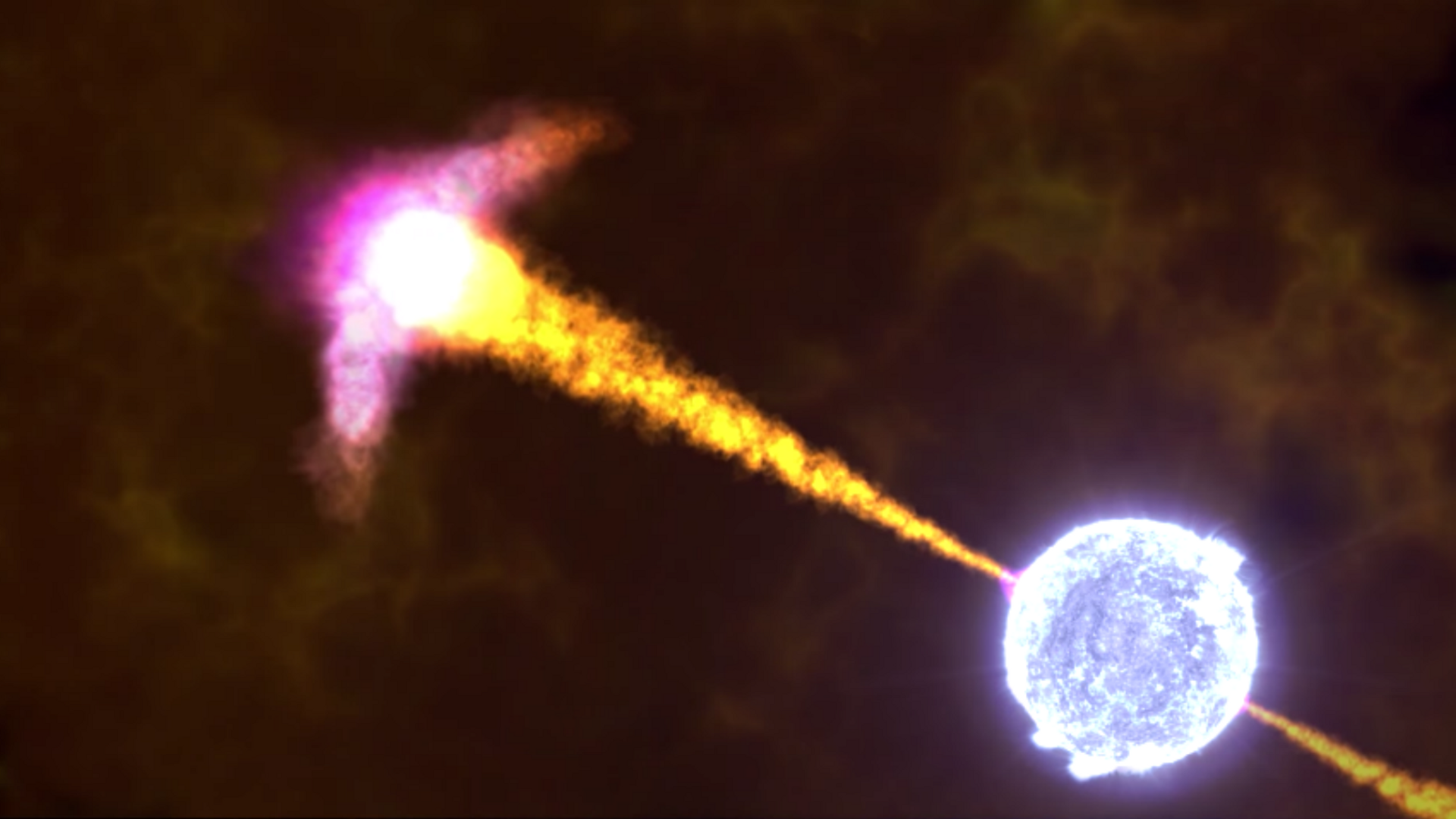https://sputnikglobe.com/20211228/scientists-clash-over-whether-mysterious-cosmic-flash-is-scientific-coup-or-russian-space-trash-1091861225.html
Scientists Clash Over Whether Mysterious Cosmic Flash is 'Scientific Coup' or... Russian Space Trash
Scientists Clash Over Whether Mysterious Cosmic Flash is 'Scientific Coup' or... Russian Space Trash
Sputnik International
The galaxy dubbed GN-z11 is considered to be the most distant and the oldest currently known galaxy. According to some scientists, it formed 420 million years after the Big Bang. Now, it appears that astronomers managed to witness a blast from this long time ago... or not.
2021-12-28T14:22+0000
2021-12-28T14:22+0000
2023-04-12T16:57+0000
science & tech
astronomy
galaxy
space
https://cdn1.img.sputnikglobe.com/img/102540/21/1025402162_2:0:1602:900_1920x0_80_0_0_c13704e1840429bc143bcdfe82b58214.png
Heated debate continues among astronomers in regard to the nature of a mysterious cosmic flash that was registered by Chinese scientists back in 2017, with the researchers themselves claiming they saw a gamma-ray burst (GRB) from the universe's infancy, while critics argued it was nothing but a reflection from space garbage.The team of astronomers from China’s Peking University was led by Linhua Jiang, with the crew working in Hawaii at the time and exploring the most distant galaxy known to humanity - GN-z11 - for clues about the universe's early life.Their expectations, as recalled by The Daily Beast, were exceeded, as they claimed to have witnessed a 13.4-billion-year old explosion - something that would be a "scientific coup" if proven true. Such a landmark discovery would likely change the study of almost everything in astronomy.However, not everyone appeared to share their enthusiasm. Polish astronomer from Adam Mickiewicz University, Michal Michalowski, proceeded to cool the Chinese team's passion, saying that what they thought was an ancient gamma-ray burst was actually nothing but a reflection from a Russian Breeze-M Proton rocket.Apparently not ready to easily believe in miraculous discoveries, Michalowski said that it could either be "an extraordinary discovery of something we have not seen yet", or something that has an "obvious explanation".Jiang's team disagrees, asserting that their calculations rule out the possibility of Russian space debris interfering with their recordings, showing that the rocket's remains were several inches away from the alleged GN-z11-flash in their telescope's view.The issue remains open, with even the Chinese team accepting that "we will never know the true nature of this flash". In order to confirm Jiang's discovery, similar data of confirmed gamma-ray bursts is needed - something that the astronomers do not possess currently.
Sputnik International
feedback@sputniknews.com
+74956456601
MIA „Rossiya Segodnya“
2021
News
en_EN
Sputnik International
feedback@sputniknews.com
+74956456601
MIA „Rossiya Segodnya“
Sputnik International
feedback@sputniknews.com
+74956456601
MIA „Rossiya Segodnya“
space garbage, far-away galaxy, gn-z11, cosmic flash, gamma-ray bursts, russian space trash, breeze-m,
space garbage, far-away galaxy, gn-z11, cosmic flash, gamma-ray bursts, russian space trash, breeze-m,
Scientists Clash Over Whether Mysterious Cosmic Flash is 'Scientific Coup' or... Russian Space Trash
14:22 GMT 28.12.2021 (Updated: 16:57 GMT 12.04.2023) A galaxy dubbed GN-z11 is considered to be the most distant and oldest currently known galaxy. According to some scientists, it formed 420 million years after the Big Bang. Now, it appears that astronomers have managed to witness a blast from this time... or not.
Heated debate continues among astronomers in regard to the nature of a mysterious cosmic flash that was registered by Chinese scientists back in 2017, with the researchers themselves claiming they saw a gamma-ray burst (GRB) from the universe's infancy, while critics argued it was nothing but a reflection from space garbage.
The team of astronomers from China’s Peking University was led by Linhua Jiang, with the crew working in Hawaii at the time and exploring
the most distant galaxy known to humanity - GN-z11 - for clues about the universe's early life.
Their expectations, as recalled by
The Daily Beast, were exceeded, as they claimed to have witnessed a 13.4-billion-year old explosion - something that would be a "scientific coup" if proven true. Such a landmark discovery would likely change the study of almost everything in astronomy.
“GRBs and their associated emission can be used to probe the star-formation and reionization history in the era of cosmic dawn”, Jiang and his team said in their initial paper, published in Nature Astronomy in December 2020.
However, not everyone appeared to share their enthusiasm. Polish astronomer from Adam Mickiewicz University, Michal Michalowski, proceeded to cool the Chinese team's passion, saying that what they thought was an ancient gamma-ray burst was actually nothing but a reflection from a Russian Breeze-M Proton rocket.
“We searched Space-Track, the largest publicly available database of Earth satellites and space debris for an object close to the position of GN-z11-flash at the time of observations”, Michalowski’s team argued. “We found the Breeze-M space debris”.
Apparently not ready to easily believe in miraculous discoveries, Michalowski said that it could either be "an extraordinary discovery of something we have not seen yet", or something that has an "obvious explanation".
“Everybody can pick the explanation they prefer, but I don’t have doubts myself”, the Polish astronomer said.
Jiang's team disagrees, asserting that their calculations rule out the possibility of Russian space debris interfering with their recordings, showing that the rocket's remains were several inches away from the alleged GN-z11-flash in their telescope's view.
The issue remains open, with even the Chinese team accepting that "we will never know the true nature of this flash". In order to confirm Jiang's discovery, similar data of confirmed gamma-ray bursts is needed - something that the astronomers do not possess currently.

